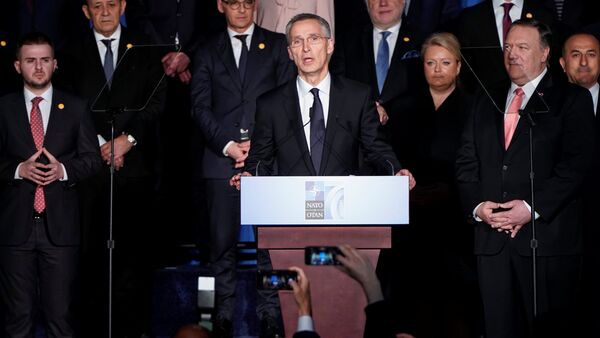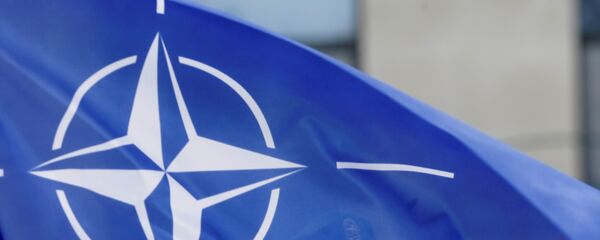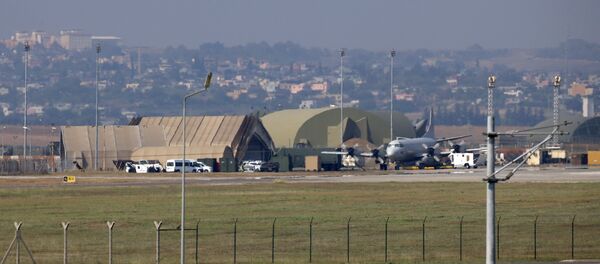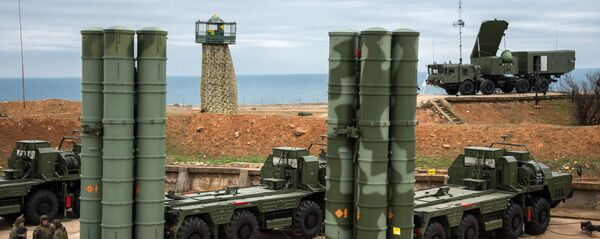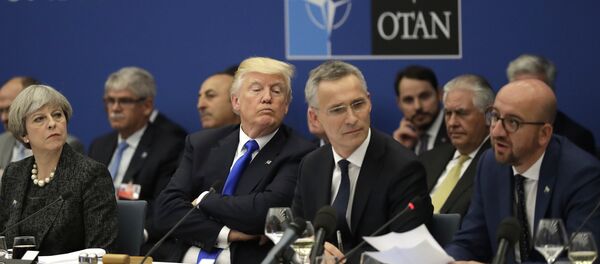Speaking before a joint session of the US Congress on Wednesday, Stoltenberg said that the alliance strives for a better relationship with Russia, but added that even without it, there would be a need to manage a difficult one.
Stoltenberg has called for dialogue with Moscow on arms control measures, adding that "we need to talk, and we do talk to reduce risks, to avoid incidents, accidents and miscalculations. We also need dialogue in order to work for arms control".
Radio Sputnik has discussed NATO's role in Europe with Scott Rickard, a former US Air Force intelligence analyst.
Sputnik: Washington has once again resorted to the rhetoric of bullying while dealing with its allies in the NATO bloc. Why is the US choosing these tactics towards their partners in the alliance?
READ MORE: Untold Story of Moscow's Efforts to End Rivalry Once and For All by Joining NATO
So I think that what we see here is not only aggressiveness against the allies per se, but also aggressiveness within the United States, where we have seen a tremendous push to increase the military spending in the United States, which is actually part of the billions of dollars that are supposedly been spent on NATO that Trump is boasting about — they are actually US defence expenditures.
Sputnik: During NATO's 70th anniversary event, Mike Pence also brought up the issue of Nord Stream 2, chiding Berlin for its involvement in the project. While the gas supplies to Germany are seemingly not connected to the military alliance, is the US crossing the line by bringing up this issue?
Certainly, the Russians have proven to be a great ally not only to the Germans, but also to other neighbours around the region, providing fuel and those types of services and petroleum resources. So, you know, the Americans are making a very soft case by calling out, and I think it is part of the traditional anti-Russian rhetoric that the Americans have pushed, due to their strong alliance with France and Great Britain.
Sputnik: Washington also picked at Turkey over Ankara's intention to purchase S-400s. How far-sighted is it for the US to bully its major ally and what could Ankara respond with?
Scott Rickard: Well, when it comes to Turkey, the US has only created a NATO partner there out of convenience. This was done despite the pushback from the original NATO partners in the 1950s, but the Americans pushed forward because they wanted the regional location, being very close to Russia. Despite the types of relations that the Americans have had with Turkey, the Americans have constantly kept Turkey at an arm's length, and vice-versa.
READ MORE: NATO Discusses Measures if Russia Violates INF Treaty — Stoltenberg
Certainly, all around Turkey when you give the locations that the Americans have been present, and the influence that the CIA has had across the Caspian Sea with Graham Fuller and those individuals. So when it comes to Turkey buying weapons and buying them from alternative suppliers, I think that is a great idea for Turkey. I think the fact is that it is the kind of presence and the kind of NATO partnership that Turkey brings — I don't think it will be much loss for Turkey or much loss for NATO. Turkey doesn't really put as much into the NATO partnership and they certainly gain much from it, but I don't think they will lose much by gaining Russia and China as partners.
Sputnik: Is it possible that Turkey could resort to closing the Incirlik Air Base as a trump card and how much of a strategic failure would it be for Washington?
Also, the presence that we are not really talking about — a nuclear presence in Turkey, although I will say that they have had short-range nuclear capabilities throughout the region, and certainly, that is not something that the Americans should have been doing. But when you look at the kinds of presence that the Americans have in Turkey, losing that would not be a strategic loss. The only strategic loss would be losing a good partner like Turkey because of the unfortunate misbehaviour by US foreign policy and military operations.
Sputnik: To what degree is Washington's rhetoric sending cracks across the bloc and could it backfire against the US in the long run?
Scott Rickard: So, I think when it comes to the rhetoric that comes out the US and how it could backfire, the main thing is that the US is really going out of its way to force spending on military operations in other nations. I think where it is really going to backfire is that we'll bankrupt nations. There are only 7 out of 29 of the nations that belong to NATO that are actually contributing more than two percent.
READ MORE: NATO Sec Gen Stoltenberg Says Hitler, Stalin and Daesh Were Enemies of Freedom
If you look at the kinds of money that we are talking about, then really the only partners that contribute to their defence spending are Britain, certainly France, the United States, and obviously, the Germans. And if you want to get anyone else, then Poland is probably in fifth place. All the other countries that are participating are not only unable to participate, but they are unable to afford to participate. So, [for] countries like Greece, that are actually committing two percent, the long-haul will be an economic failure for those countries trying to invest in infrastructure which their economies really can't sustain.
